and GPS - Global Positioning System
- includes segment on Geocaching

| M-COMMERCE
and GPS - Global Positioning System - includes segment on Geocaching |
 |
This
page last updated 2016 Feb 1
-
see also related page www.witiger.com/ecommerce/locationdeterminant.htm
| GPS Terms |
GPS -
Global Positioning System, reached full operational capacity in 1995
- proper name "the United States NAVSTAR Global Positioning System" - achieved by constellations of about 30 Medium Earth Orbit (MEO) satellites in different orbital planes. - managed by the United States Air Force 50th Space Wing. SPS - Standard Positioning Systems - within 100 metres - the U.S. military has removed restrictions on commercial use of SPS PPS - Precise Positioning System (encoded by U.S. military)- within a few metres AGPS - Assisted GPS, the use of cell towers to augment GPS identifying where the person is inside a building |
ANS - All Source Positioning
and Navigation
GNSS - Global Navigation
Satellite Systems - generic term; (GPS) is the only fully operational GNSS.
The European Union's Galileo
positioning system is a GNSS in initial deployment phase, scheduled to
be operational in 2014
The People's Republic of
China has indicated it will expand its regional Beidou navigation system
into the global Compass navigation system by 2015.
| GPS in 2016 | Adaptable Navigation
Systems (ANS)
darpa.mil/program/adaptable-navigation-systems "DARPA is developing high-precision
clocks, self-calibrating gyroscopes and accelerometers, and high-precision
navigation instruments that can track position for long periods without
relying on external sources."
navipedia.net/index.php/GPS_Future_and_Evolutions
|
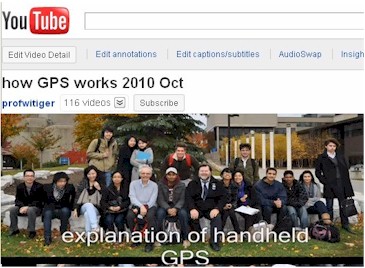 |
Video of WTGR explaining
how a handheld
GPS unit works in tracking pedestrian or vehicle movement youtube.com/watch?v=BI27bhwA3fI |
| GPS in 2010 | Stig Kristoffersen,
a civil engineer and geoscientist, wrote in May 2009 "old satellites administrating
the GPS system are not exchanged with new ones."
Kristoffersen and other claim that several satellites will stop working in the period form 2010 to 2016. When this happens, the GPS system might become gradually more unreliable. Kristoffersen explains "In order to be accurate, the GPS system relies that a minimum of 24 satellites continuously working together." Some people are questioning whether the US airdefence will get new satellites fast enough to maintain full power on the system without any discontinuity. According to the Government Accountability Office report, “In recent years, the Air Force has struggled to successfully build GPS satellites within cost and schedule goals” as part of a $2 billion modernization program. “If the Air Force does not meet its schedule goals for development of GPS IIIA satellites, there will be an increased likelihood that in 2010, as old satellites begin to fail, the overall GPS constellation will fall below the number of satellites required to provide the level of GPS service that the US government commits to.” read more at http://pakalert.wordpress.com/2009/05/21/gps-system-in-us-could-fail-by-2010/ |
| Question:
What technology needs to develop for location determinant commerce
to "take off", meaning the ability to market to customers based upon where
they are actually located?
Answer: GPS enabled Cell Phones |
GPS
Links and Related Sites
http://www.gmat.unsw.edu.au/snap/gps/gps_links.htm
The University of
New South Wales, Australia
GPS applications exchange
http://gpshome.ssc.nasa.gov/
A-GPS
http://www.navigadget.com/index.php/gps-knowledge/a-gps-assisted-gps/
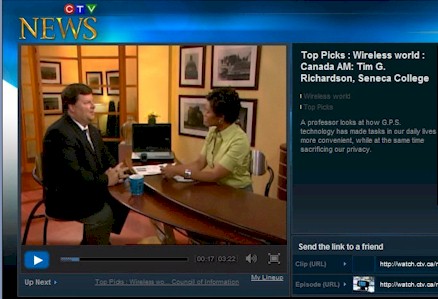 |
In 2nd week of
July 2008 Prof. Richardson was interviewed on CTV television show "Canada
AM" for a segment on GPS.
The clip is very brief, but
it provides a useful intro to the basics of
You can watch the clip on
the CTV website at
|
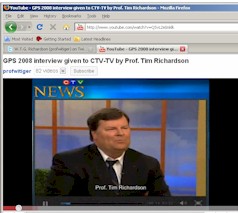 |
In early Sept
2010 I (WTGR) took the 2008 CTV interview and added some additional commentary
and posted it on YouTube
youtube.com/watch?v=QSvL2eImklk Students can look at this version and earn class participation marks by making comments. |
.

Deitel CHPT 6 page 168
|
Location Tracking
GPS - Global Positioning
System
- 24 satellites in six circular
orbits
SPS - Standard Positioning
Systems - within 100 metres
Deitel text p. 152 - the point being that your interaction with the WWW is not determinant on your location - but, you as a customer have a location based on where you are - so vendors will sell to you based on where you are - your "circumstances" are location determinant |
| GPS
Technical Introduction
|
|
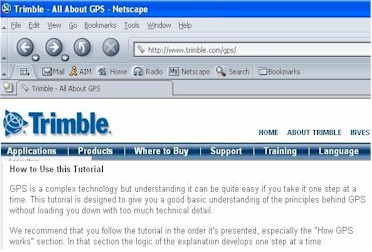 |
"How GPS works"
This website has an online tutorial about GPS and understanding it
|
| How GPS works | according to Trimble.com
Here's how GPS works in five logical steps: 1. The basis of GPS
is "triangulation" from satellites.
permission quote from trimble.com given by LeaAnn McNabb in their California office 2005Nov08. Copies of emails kept in the permissions binder |
| How GPS works | according to Trimble.com
Here's how the GPS network is structured Copyright © 2003-04 LeckMedia, LLC from Jake's GPS Tutorial (was at www.ipaqhq.com/articles/articles/18) GPS has three parts – 1. Satellites, 2. Receivers, 3. Ground stations. "Satellites – The satellites are in 12 hour orbits at 20,200 KM (12,550 miles) altitude. At this altitude they can be seen over large portions of the surface. Although GPS works from pole to pole, none of the satellites are in polar orbit. The orbits are approximately 12 hours long, which means that they move slowly in the sky and can be used by any individual receiver for a long time. They are NOT geosynchronous, so the “constellation” of satellites that any given receiver can see at any given time is constantly changing." "Signals – The satellites transmit multiple signals. For most of the cycle they transmit the time based on an on-board atomic clock, but every thirty seconds they transmit information about where they are in space, called ephemeris or ephemeredes and information about the general location of the other satellites, is called the almanac." "Ground Stations – monitor the health of the satellites and any changes in the satellite orbits and update the ephemeris data accordingly. The USAF has a dedicated command that monitors the health of the entire set of satellites and updates the ephemeris data as the orbits are affected by external forces." |
| How
GPS
works when used in combination with a cell phone |
|
| GPS
?
cell phones |
Assisted
GPS
 |
Telus
explains
"the location of a mobile device is determined by triangulating the position of at least three satellites orbiting around our planet with the added help of the our [Telus] network" WTGR adds, while three will work, it is better if 4 or even 5 satellites are over the area you are operating in so the signal can be triangulated with more accuracy. "Added help" means the Telus system works in further position information based upon where the user is in the cell phone network, which can further define and refine location info down to a few metres. |
| GPS
?
cell phones |
Hybrid Triangulation
 |
Telus
explains
"If line of sight to three satellites is not available, then hybrid triangulation uses a combination of both GPS and the closest cell sites to identify the location" WTGR adds, this hybrid approach is very useful when a person is in a location blocked by a building or cloud cover or bad weather. It means essentially that you can have location based data even when GPS sources are not fully available. |
| GPS
?
cell phones |
Network
Triangulation
 |
Telus
explains
"If no satellites are in the phone’s line of sight, then network triangulation uses the closest cell sites to the mobile phone to identify the location" WTGR adds, this is not as satisfactory as having satellites to locate you, but in the event you are inside a building, it can tell your position within a city block or two - depending on what part of the city you are in and how far apart are the cell towers. |
| GPS
?
cell phones |
Cell site
location
 |
Telus
explains
"should all of the above fail, the location of the cell site that is in contact with the mobile device will be provided" WTGR adds, this would allow you to be identified within a kilometre or two, depending on how far away you are from the tower. |
| GPS
- Global Positioning System
and
|
GPS in cell phones and
consequent Privacy Concerns
article was at abcnews.go.com/sections/scitech/FutureTech/e911cell030304.html
|
| GPS
- Global Positioning System
and
|
GPS in cell
phones and consequent Privacy Concerns
Paul Eng wrote
"..following an FCC requirement mandated in October 2001, cellular service providers must deploy a more accurate E911 system, so-called Phase Two. Under the next stage of wireless E911, every cellular phone service provider would be required to share with PSAPs (Public Safety Answering Points - the places that run the 911 system) a user's actual location data. "By the end of 2005, wireless E911 systems are expected, at a minimum, to help operators pinpoint a cell-phone caller's location to within 100 meters 95 percent of the time. This automatic tracking ability is the one that has many privacy advocates concerned the technology may be abused by others, including law enforcement officials...while the FCC mandated the E911 program, federal legislators haven't put into place how that information may be used or who would have access to it." |
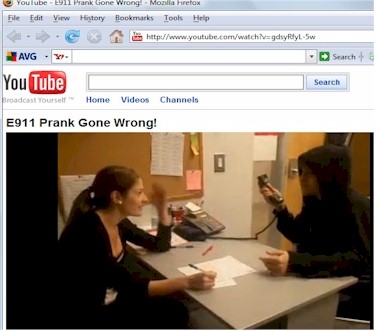 |
e911
A humourous explanation of the basics by students in BCS555 at Seneca College, 4th week of October 2009. The emphasis is on the consequences of authorities being able to identify callers to 911 based on the GPS identifiers in certain types of cell phones. thanks to
|
| GPS
and
|
e-911 "TEXT
911"
"checked with my contacts at the CNIB www.cnib.ca re: TEXT 911 and asked if this will incorporate GPS identifiers see also thestar.com/business/article/1132780--crtc-tests-911-texting-for-hearing-and-speech-impaired |
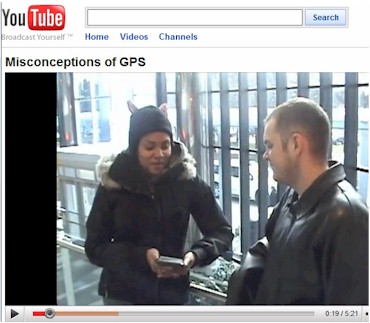 |
GPS Misconceptions
A humourous explanation of the some of the misconceptions about GPS by students in BCS555 at Seneca College, 1st week of November 2009. Probably a good video to watch for "first-time users" roles played by students
filmed / edited by
|
| GPS
- Global Positioning System
and
|
GPS in cell
phones and consequent Privacy Concerns
http://www.intergovworld.com/article/b8778ebd0a01040800a1918ea11eacef/pg1.htm Rowell explains "Since 2005, phones sold in the United States have been GPS-enabled to accommodate the FCC E911 regulation requiring that cell phone carriers be able to locate specific phones for 911 emergency calls...But there's a big issue ... this increased location monitoring means you can be tracked by a lot of folks" |
| GPS
- Global Positioning System
and
|
GPS in cell
phones and consequent Privacy Concerns
|
| GPS
- Global Positioning System
and
|
Divya
then explains the Pros and Cons
"There are several Pro's of having such a feature installed in your car such as knowing exactly where your child and car are, whether your child reached their destination and even knowing how responsible your child is behind the wheel! However, a Con that may result from this new technology is that Insurance companies can now track the child's driving pattern too, which may or may not affect the insurance payments. Although, when I was watching this on Global News, they mentioned Insurance companies might base the insurance payments on the results they recieve from the GPS unit." |
| GPS
applications in other IT devices |
GPS applications in other
IT devices
|
| GPS
applications in other IT devices |
GPS applications in other
IT devices
WTGR replies
I could see something like this used in real estate, geological exploration, criminal investigation, travel and tourism - the list might be endless |
| Who else is doing GNSS - Global Navigation Satellite Systems | Europe
- "The European Union and European Space Agency agreed on March 2002 to
introduce their own alternative to GPS, called the Galileo positioning
system. the system is scheduled to be working from 2012. Galileo is expected
to be compatible with the modernized GPS system."
Blogger Mary Johnson said "The projected number of satellites in the Galileo constellation has already been reduced from 28 to 22 initially, due to cost overruns." Russia - "GLObal'naya NAvigatsionnaya Sputnikovaya Sistema(GLObal NAvigation Satellite System), or GLONASS, was a fully functional navigation constellation but since the collapse of the Soviet Union has fallen into disrepair.... The Russian Federation has pledged to restore it to full global availability by 2010 with the help of India, who is participating in the restoration project" China "indicated they intend to expand their regional navigation system, called Beidou or Big Dipper, into a global navigation system; a program that has been called Compass" read more at http://en.wikipedia.org/wiki/Global_navigation_satellite_system |
| Examples of how GPS can be used with other "new technologies" | . | GPS
? RFID and Corporate Security
|
| How
GPS, sometimes, does NOT work |
It is important to understand
that in the early years of using GPS, there are some circumstances that
make it an imperfect science, and vulnerable to the "Geographic Environment",
particular weather. Extreme weather, hurricanes, typhoons etc. can effect
the ability of a signal to reach the satellites, therefore making a GPS
reading difficult. People who are developing a business based on GPS information
need to develop contingencies to deal with this interuption.
However I would suggest that if you are in the middle of a Class 5 hurricane - getting a GPS lock is probably NOT your biggest problem - getting the hell out of there is probably more important !! Secondly, GPS sometimes does
not work in some types of vehicles because of the metallic roof. "Jake's
GPS Tutorial" says "...if your car offers some sort of electronic de-misting
or defogging option, that option will probably block GPS signals". It is
better to put an antenna on the roof or use the GPS outside the car.
|
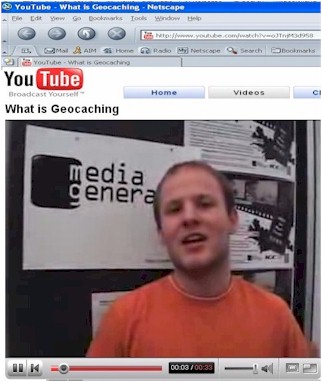 |
GEOCACHING
geocaching.com In early Feb 2008, several students in the MGD415 class at the University of Toronto (MIssissauga Campus) put together a couple of quick videos illustrating some of the basic points of GPS together with some examples of how such interaction is useful. Phil H. did a segment on Geocaching and if you click on the image to the left it take you directly to the YouTube URL for that segment. WTGR 2008 Feb 13 |
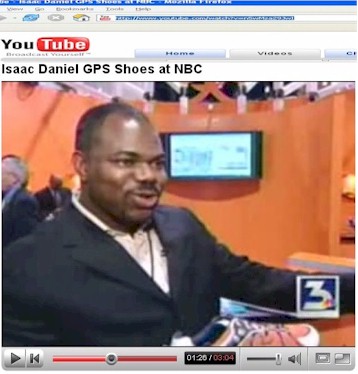
screen capture of YouTube clip featuring Issac Daniels explaining his "GPS in shoes" invention |
student Ruvani
P. at UTM in MGD415 in March 2008 emailed to show a story about GPS in
shoes?
Ruvani said
I'm not sure if you've already heard about this, but Isaac Daniels www.isaacdaniel.com idconex.com
|
| Ruvani explains
The technology can be activated by switching a button on! The chip is embedded in the sole of shoes, with a small 20 GB hard-drive that can be recharged every three weeks. Parents can ping the device and connect to the tracking service called Id connex to find out where their missing child is or even an alzheimer?s patient. Will this patent make disappearance a thing of the past? Ruvani concludes
|
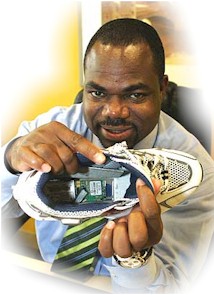 |
| GPS
pros and cons |
GPS Pros and Cons
|
| GPS Pros and
Cons - Automobiles
- by Salma A. 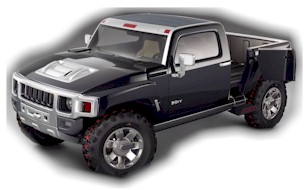
. |
Pros:
|
| GPS
Pros and Cons
- Cell Phones - by Salma A. 
. |
Pros:
|
| Salma concludes "Thus, GPS embedded into technology mostly used can have both positive and negative effects in our lives. However, having GPS on your cell phone is scarier because a cell phone is always with you, even when you take the bus to your friends house." |
|
|
CONTACT I MAINP AGE I NEWS GALLERY I E-BIZ SHORTCUTS I INT'L BIZ SHORTCUTS I MKTG?BUSINESS SHORTCUTS I TEACHING SCHEDULE |
| . | |
| MISTAKES I TEXTS USED I IMAGES I RANK I DISCLAIMERI STUDENT CONTRIBUTORSI FORMER STUDENTS I | |
| . |
.